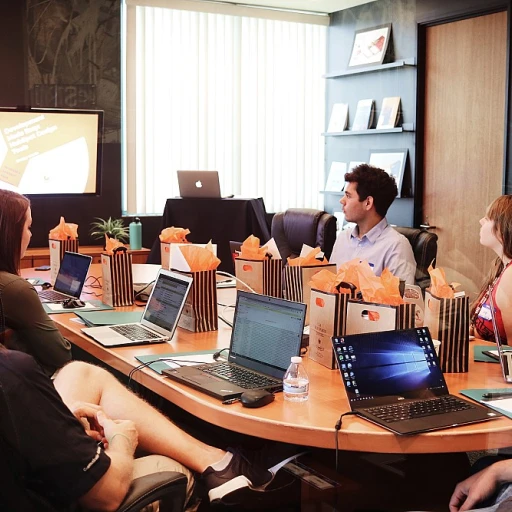Understanding Remote Work for Teens
Exploring Remote Work Avenues for Young Teens
In today's dynamic employment environment, the concept of remote work is not just reserved for seasoned professionals. Young individuals, particularly those who are 15 years of age, are beginning to explore opportunities that offer flexibility and the chance to earn while balancing their academic responsibilities. The traditional image of teen jobs at grocery stores or fast-food outlets is expanding, providing more diverse options for youth willing to explore the digital landscape.
For teenagers, diving into remote work can seem daunting at first. However, with technological advancements and a broader acceptance of flexible work arrangements, finding opportunities for young workers is now easier than ever. It's essential to understand what remote work entails and how young individuals can benefit from it without compromising on their education or violating any employment laws.
The Rise of Remote Labor among Young Teenagers
The shift towards remote work has numerous advantages for young individuals. It helps mold future-ready skills such as communication, time management, and technological proficiency. Teenagers today are keen to explore different avenues, from content creation and graphic design to customer support and virtual assistance. This early exposure not only contributes to their personal development but also positions them well for future career pursuits.
Moreover, remote job opportunities often allow for more flexible work hours compared to traditional jobs. This flexibility is crucial for 15-year-olds who need to juggle their school commitments along with their work responsibilities. It also provides an excellent way for teenagers to gain a level of autonomy and contribute to their household finances or cover personal expenses.
Legal Framework and Work Opportunities
Navigating the legal landscape of remote work for teenagers requires thorough understanding. Given the complexities surrounding child labor laws, parents and teens should acquaint themselves with the requirements for work permits and employment certificates. The U.S. Department of Labor outlines specific guidelines that define the permissible work hours and restricted job roles for young individuals to ensure their safety and well-being.
It's crucial for both guardians and teenagers to be aware of the legal constraints and obligations involved. Some employers, including popular outlets like Dairy Queen, may have specific hiring age requirements and necessitate compliance with local labor laws across different states. To avoid any legal pitfalls, one must adhere to these guidelines when seeking employment for 15-year-olds.
In conclusion, remote work presents lucrative opportunities for young workers. By understanding the intricacies of the work landscape—coupled with legal preparedness—teenagers can embark on a rewarding journey that balances both education and earning potential. For more insights into the potential paths in the remote work sector, you may explore the detailed examination on
exploring remote nursing opportunities for beginners.
Legal Considerations and Age Restrictions
Analyzing Age Laws in Remote Work
Understanding the legalities and age restrictions surrounding remote work for teens is crucial. While remote work offers flexibility, it also necessitates adherence to specific legal guidelines, particularly concerning young workers. Many regions have established child labor laws that determine the minimum age for employment and regulate work hours.
For 15-year-olds, the rules vary depending on the state or country. For example, in the United States, federal child labor laws monitored by the Department of Labor specify a minimum age requirement and often require an employment certificate or work permit for workers young like 15-year-olds. Specific jobs such as working in grocery stores, serving ice cream at locations like Dairy Queen, or even joining a state conservation corps program might have different hiring ages and legal requirements.
In addition to age restrictions, there are limitations on the number of work hours a young person can fill each week. These restrictions are designed to ensure that teenagers can balance their school commitments effectively while engaging in the labor force.
Furthermore, it is vital to consider insurance policies and employment certificates wherever necessary to comply with individual state laws. Businesses that hire year-round, such as grocery and convenience stores, must ensure strict adherence to these labor laws to prevent any legal ramifications.
In conclusion, before diving into remote work opportunities, it is recommended to contact your local state employment department for specific guidelines or information. This approach secures a lawful and beneficial working environment for youths entering the employment world. Moreover, teenagers can also find inspiration in
motivational quotes to keep their morale high as they enter the workforce.
Popular Remote Jobs for 15-Year-Olds
Diverse Opportunities Youth Can Explore
For teenagers aged 15 seeking remote work opportunities, the digital landscape has opened up a vast array of options. Many positions cater specifically to this age group, presenting viable options without the need for leaving the comfort of one's home or conflicting with school commitments.
- Content Creation and Writing: At 15, the written word can be a powerful avenue. Platforms are always in need of fresh perspectives — whether it be writing articles, contributing to blogs, or assisting with copywriting. If you enjoy expressing ideas through writing and possess a good grasp of grammar, this could be your fit.
- Data Entry and Online Surveys: Simple yet effective, data entry jobs provide a great entry point into the remote work world. Completing online surveys is another area where teens can generate income by providing feedback. It's vital to ensure that the platforms are reputable and designed to protect young workers.
- Social Media Management: Being a digital native, you might have an innate knack for platforms like Instagram or TikTok. Helping manage or promote small businesses' social media presence can be both a fun and educational job.
- Virtual Tutoring: If you excel in a particular subject at school, offering tutoring services to peers or younger students can be both rewarding and lucrative. Online platforms often provide the means to connect with learners needing assistance.
The
potential of remote work for youth doesn't stop there. With dedication, young workers can balance part-time remote jobs alongside school duties efficiently. It's crucial, however, to be mindful of child labor laws. For instance, the minimum hiring age can differ by state, and a work permit might be necessary. Moreover, school and state regulations may restrict work hours to protect daily routines and ensure focus isn't lost on education.
Considering these aspects, remote work for 15-year-olds serves as a stepping stone for future employment, training them to effectively manage time, develop skills, and safely navigate digital workplaces.
Balancing School and Remote Work
Striking the Right Balance Between Academics and Remote Work
For 15-year-olds venturing into the remote work scene, balancing school commitments with employment is paramount. Juveniles embarking on their employment journey must navigate child labor laws that dictate permissible hours of work and align them with their academic schedule.
Young workers need to adhere to laws limiting the amount of time spent on labor during the school week. These restrictions are set by state and federal agencies to ensure that schooling remains the top priority. For instance, during the academic year, juvenile workers often cannot exceed three hours of work on school days and eight hours when school is not in session.
Here are some vital aspects 15-year-olds should take into account:
- Work Hours and Study Schedule: Creating a strategic timetable is essential. Align your school schedule with the work hours allowed by your state’s department of labor to ensure smooth adaptability between studies and remote employment responsibilities.
- Employment Certificate Requirement: In many locations, an employment certificate or work permit is essential for legal work engagement. This can be obtained easily with parental guidance and usually involves contacting the local school district or labor department.
- Investigate Flexible Work Locations: Remote opportunities in fields like customer service or digital content across companies, online stores, or local grocery stores provide a flexible schedule that is adaptable for students. For instance, a job at an ice cream parlor or a Dairy Queen location can sometimes give you flexible schedules that cater to a student’s school hours.
- Skill Development Opportunities: While balancing schoolwork and employment, consider engaging in positions that develop skills beneficial for your future career, such as through programs like Youth Conservation Corps. These can play a pivotal role in shoring up both your labor skill set and academic prowess.
By maintaining a clear focus on academic objectives and adhering to employment parameters set out by state and federal laws, young workers can make beneficial use of their time while gaining noteworthy skills and experiences. Such balance not only ensures compliance with labor laws but also solidifies a foundation for future success.
Building Skills for Future Careers
Enhancing Abilities for Remote Work Pathways
Building skills at the age of 15 is a crucial aspect for future success in remote work. This period in life is ideal for cultivating abilities that can be pivotal not just in remote jobs but across various career paths. With remote work becoming increasingly prevalent, young workers can focus on developing a blend of technical and soft skills.
To start, technology proficiency is a must-have. Understanding basic computer functions and software is essential. Participating in online courses can be a convenient way for 15-year-olds to enhance their technical skillset without conflicting with school responsibilities or work hours. Additionally, familiarizing themselves with online collaboration tools like video conferencing platforms, spreadsheets, and document-sharing software will significantly aid their remote work experience.
Equally important are soft skills such as communication and time management. Successful remote workers often exhibit excellent verbal and written communication skills, enabling them to articulate ideas clearly across digital channels. Time management is another crucial competence, helping young workers balance their school work with employment responsibilities. Setting a routine that accommodates study, work, and relaxation can help maintain consistent productivity and prevent burnout.
Participation in extracurricular activities can also bolster skills development. Clubs focused on public speaking, writing, or technology can offer practical experience and further enhance interpersonal skills. Furthermore, volunteering or part-time jobs at local stores or organizations can provide teens with a firsthand look into the labor market and its expectations.
Lastly, awareness of labor laws and legal guidelines regarding youth employment is vital. Understanding child labor laws ensures that young workers are protected and working within legal restrictions, such as the minimum age and work hours. By being informed, teens can ensure their remote work endeavors align with state and federal regulations, securing a safe and compliant employment experience.
By embracing these skill-building strategies, young remote workers position themselves advantageously for a wide array of future career opportunities. These foundational skills form the bedrock of their professional development, leading to a fruitful and resilient career journey.
Safety and Privacy in Remote Work
Ensuring a Secure Remote Work Experience
When considering remote work opportunities for 15-year-olds, it's crucial to prioritize safety and privacy. With youth eager to dive into the digital labor landscape, both parents and young workers must understand the potential risks involved.
Online safety is a primary concern. Ensure that the remote work platforms or employers are legitimate and have secure systems in place. Parents should regularly monitor the child's online interactions, ensuring they do not disclose sensitive information that could jeopardize their privacy.
Regularly checking with the relevant state department of labor can provide updates on permissible work hours for minors. This helps in avoiding potential violations of labor laws. Each state may have its specific child labor regulations, dictating how many hours per week and the times during the day when work is acceptable. Staying informed helps maintain a balanced lifestyle, ensuring school is not neglected in pursuit of remote work.
Some roles, like those at popular chains like Dairy Queen, might require an employment certificate, also known as a work permit, especially given the hiring age requirements. Employers typically provide guidance on how to obtain these documents through the state’s labor department.
As young workers navigate remote job opportunities, reinforcing the idea that their privacy and safety are just as important as the work itself is key. Parents should keep open lines of contact with their teens, encouraging them to report any uncomfortable interactions or suspicious activities encountered online.














